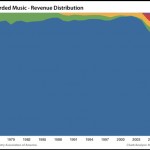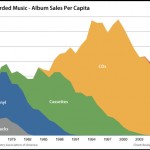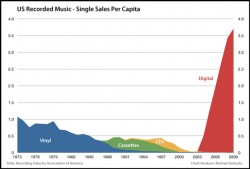Weekly News Roundup (17 July 2011)
A news-tastic week, and I guess we were due one. It’s a shame, because I was quite busy messing up my Paper (Star) Wars Android game update, in which I released not one, not two, but three versions of the app. It always happens like this though, you get ready to release an update, do all the testing you can, confident that it works, and then you release it only to find that it’s introduced even more bugs than before. But sometimes it’s hard to properly test an app that, according to Android Market, can be deployed on 430+ different Android devices. I added a crash report feature to the app, so that I can get a report every time it crashes, and so far, no new crash reports in the last 72 hours, so that’s something I guess. I also took the opportunity to add an official website for the app, which includes some getting started tips, and also Facebook and Twitter pages.
With plenty of news to go through, let’s get started.
 In Copyright news, opposition to the controversial PROTECT IP act is gaining momentum, as this week, more than 100 law professors from around the United States have signed an open letter urging Congress to reconsider the new copyright legislation.
In Copyright news, opposition to the controversial PROTECT IP act is gaining momentum, as this week, more than 100 law professors from around the United States have signed an open letter urging Congress to reconsider the new copyright legislation.
So we’ve had Internet pioneer, leaders in the field of technology, and now also law experts, all coming out attacking PROTECT IP. The law professors repeated the same warnings about messing with the Internet’s naming system, but more importantly, they argued that, from a freedom of speech point of view. But it won’t be the first time Congress has ignored expert advice in favour of lobbyist suggestions, and so, I’m not too hopeful that PROTECT IP will be defeated.
And the politicians will not find it a difficult to support the RIAA and MPAA, because, as you know, it’s all about the jobs. The RIAA and MPAA have been arguing that tougher copyright protection means more jobs, and a politician in the current climate can’t afford to be seen as being anti-jobs, even if it is at the expense of being anti-free speech. But a new report by the Computer and Communications Industry Association (CCIA) shows that tougher copyright laws may actually have a negative effect on job creation, as it turns out, the US economy these days are very much driven by fair use related activities. Even I didn’t realise that fair use related industries accounted for 17% of the entire United States’ GDP, some $4.5 trillion in value added contributions. That’s much greater than the film and music business combined, and it makes sense when you see companies like Google, Facebook, Mozilla all embracing open source and taking advantage of fair use in some way.
PROTECT IP, in many ways, is just a protectionist measure in favour of the film and music business, and such measures always hurt other industries, and in this case, it’s the huge tech/Internet industry. But because one industry is more active in lobbying than the others, common sense does not always prevail in Washington. And just because the film and music business receives more protection, it doesn’t mean that they actually benefit financially as well, because tougher copyright laws does not equal more sales (and could even equal less).
If the US wants to see a real world example of tougher copyright laws, and the effect it has on revenue, they can simple look towards France, and see how their “Hadopi” three-strikes law (named after the agency, Hadopi, that is in charge of administering the program) is working out. A new report shows the extraordinary level of monitoring that occurs, some 18 million incidents of piracy were recorded in just nine months. But out of the 18 million, only 470,000 users were sent “first-strike” emails, warning them of alleged copyright infringement being conducted via their Internet accounts. And then, in what seems to be strongest indication of the effectiveness of three-strikes, only 20,000 “second-strike” emails were sent out, suggesting that 450,000 people took the first warning the right way and “stopped” pirating. And at the end of it all, only 10 people were being considered for further action after reaching their third strike – so that’s millions spent to catch 10 people.
But despite what appears to be a 95% reduction in piracy (going from 470,000 first time offenders to only 20,000 second time offenders), there’s almost no information on the actual economic benefits of the reduction in piracy, if the reduction even exists. I can only assume that there has been no positive effect on music and movie sales in France as a result of three-strikes, because otherwise, the RIAA/MPAA would be using it as evidence that every country in the world should adopt graduated response. And just because people stopped being detected, it doesn’t mean they’ve stopped pirating – direct downloads have never been monitored by Hadopi, and it’s impossible for them to monitor BitTorrent usage if it’s done via a VPN either.
It makes perfect sense to me though, that if someone who couldn’t afford to buy a movie or a piece of music still remains in the same situation after tougher copyright laws are introduced, and as long as this is true, there can be no increase in revenue. People will stop enjoying content illegally, and if they can’t afford the legal version, they will simply stop enjoying the content entirely. And this reduces the word of mouth effect, and also prevents “upgraders”, those that download illegally and then purchase later because they really liked the content. And so, tougher copyright laws may actually lead to revenue loss. The truth of the matter is that movie home entertainment revenue is much higher than what it was before the Internet become popular, and so is gaming. And that while the music industry isn’t doing as well, increased competition from other sectors (such as movies and gaming), and the increasing popularity of purchasing music singles over albums, are all more accountable for the decline in revenue than just piracy. The music industry needs to stop blaming piracy on all of its problems, and the movie industry needs to stop pretending there is a problem (what with box office receipts at an all time high, and home entertainment revenue up significantly compared to 15 years ago).
The truth is that the way people consume content has changed drastically, and yes, a lot of that is due to the Internet. But with change, comes opportunity, and if the film and music industry aren’t interested in exploring the new opportunities, others will, and in this case, it has been the technology companies, like Apple and Netflix, that has benefited the most. And the latest to join their ranks may be Spotify, which has just been launched in the United States, albeit in a limited invitation only phase. Spotify attempts to address one of the fundamental shifts in media consumption, the lessening need to “own” music (well, people never owned music anyway, there merely licensed a recording of it), and the increasing need to consume (which makes owning far too expensive and time consuming to manage). So instead, people stream all the music they want in an on-demand fashion, for free if they’re willing to put up with ads. It’s completely legal, so no moral guilty as compared to piracy, plus the music industry can receive financial compensation. And those that do want to “own”, or at least rent, can buy one of Spotify’s paid for plans, with more money going towards the music industry. With Spotify, there’s almost no reason at all for pirating music.
And in a similar vein, UltraViolet for movies also attempt to change the way content is sold to more closely follow the consumer’s needs, an ambitious project that has the backing of more than 70 companies from a range of industries, with support, albeit reluctantly at certain aspects of it, from the movie industry. This week, UltraViolet licensing beings officially, and beta testing is also under way for an official launch later this year. If it works, it will finally allow movie lovers to buy the movie (or license it), as opposed to just buying the media that the movies comes on. It’s Digital Copy, but done right, with industry wide support, and done via the Internet.
And so, there is hope, that the music and film industry can embrace change and come out the other side stronger than before. Let’s just hope they don’t erode all of our civil rights, in a vain attempt to use legislation to stop copyright infringement, before then.
And finally, before we move on to other topics, the MPAA’s lawsuit against Hotfile has some new developments this week, as the judge in case threw out the MPAA’s claim of direct copyright infringement, simply on the grounds that Hotfile themselves did not upload any of the content that is considered to be infringing on the MPAA’s copyrights. However, the judge did feel Hotfile can be found guilty of secondary copyright infringement, of inducement to infringement by paying affiliates money for uploading popular content. I don’t think it will end well for Hotfile unfortunately, as the MPAA has chosen their target wisely, by choosing a file sharing host that actively promotes popular uploads with payment, and thus, encourage users to upload pirated content.

In HD/3D news, a new report suggests that Blu-ray will beat DVD by 2014 to become the most popular disc format around.
But even by then, Blu-ray’s gain in revenue would not have offset DVD’s loss, and so it will be digital media that saves the day. The report, from London-based Futuresource, says that at that time, physical media will still account for more than half of the industry’s revenue, but digital media won’t be too far behind, accounting for 46% of the market.
While Blu-ray only accounts for 13% of the sell-through market last year, it’s not too hard to believe Blu-ray will get close to 50% by 2014, especially if you look at recent data as listed in our weekly Blu-ray/DVD sales analysis. Blu-ray revenue, in the US at least, appears to be already above the 20% mark on average, and for some recent releases like ‘Sucker Punch’ have managed to has a first week Blu-ray market share way above this average (61.42% to be precise).
There was also the news that 3D Blu-ray, despite the predictions of doom, has already sold some 3.5 million discs. Of course, half of these discs were given away with hardware, but with Avatar still not available for general sale on Blu-ray 3D, the number is still impressive. The main reason for the good result, and the good result of Blu-ray in general, is pricing. Blu-ray combos are now the best value packaging around usually, and with Blu-ray 3D “mega” combos becoming more popular (that is, the Blu-ray 3D version plus the Blu-ray 2D version, plus the DVD and Digital Copy versions), 3D is benefiting as a result.
What has decrease in value this week though is Netflix subscriptions, with price rises of up to 60% being announced. Netflix says the reason for the increase is due to their renewed focus on DVDs, by separating DVD and streaming into two separate, and cheaper plans (but at the same time, increasing the price of the combined plan). I suspect this price rise has to do with Netflix’s need to renegotiate digital rights for movies, with them having just agreed a new deal with Universal, and the need for a new deal with Sony. The rise in popularity of Netflix is obviously making studios feel they’ve not got the best deal they can, and they will want to squeeze as much out of Netflix as possible.
And before we move onto gaming, the news this week that new PS3s won’t be able to output Blu-ray in HD over component shouldn’t come as a surprise for those that read my news article on the Blu-ray analog sunset. Blu-ray’s copy protections system, AACS, mandated the removal of HD component support for all new players manufactured after January 1st 2011, and so the new PS3 model is just following the licensing agreement. The misinformation over HD being disabled even for games and streaming, is just that, misinformation.
![]()
And in gaming, there’s actually not much, but I wanted to address the NPD issue again. The NPD report for June has just been released, and as been the case recently, it’s light on actual details, especially for hardware sales figures. But Microsoft and Nintendo have decided to released hardware sales figures for their consoles, once again leaving Sony as the holdout.
I’m hoping a leak will reveal the Sony PS3 numbers in the next few days, but even without the leak we can deduce that the PS3 probably didn’t do very well in June, despite Infamous 2 selling extremely well. First of all, the Xbox 360 was the most popular console with 507,000 units sold, while Nintendo revealed the sale of 273,000 Wiis. Microsoft’s statement mentioned their 507,000 was nearly twice as much as other home consoles, confirming the Wii number at least and pointing to the fact that the Wii was probably the second best selling console. And with Sony’s statement only pointing to the success of Infamous 2, with no acknowledgement of year-on-year growth for the PS3 (something they’ve been vocal about recently). In fact, Microsoft’s statement actually says the Xbox 360 is the only console to have year-on-year growth in June.
So the PS3 sold less than in June 2010 (304,800 units), and so the only issue is whether the PS3 outsold the Wii or not. Microsoft’s statement mentioned that the Xbox 360 held a “48% share of the overall current-generation console market share”, although it was unclear whether this referred to June or the whole of 2011 (it’s not lifetime sales, that’s for sure). Assuming it is for June, and for home based consoles only, then a little bit of maths puts the PS3 at 276,250 units (if 507,000 was 48%, extrapolate to 100%, then minus the known 360 and Wii numbers, to get the PS3 number).
But I hate guessing, so I’ll wait a few more days to see if there are any leaks to confirm my theory, but if not, then I’ll give Sony the benefit of the doubt for not mentioned they outsold the Wii, and use the estimated 276,000 figure.
That’s all for this news filled week. I suspect the next week will be very barren indeed news wise. See you next week.






